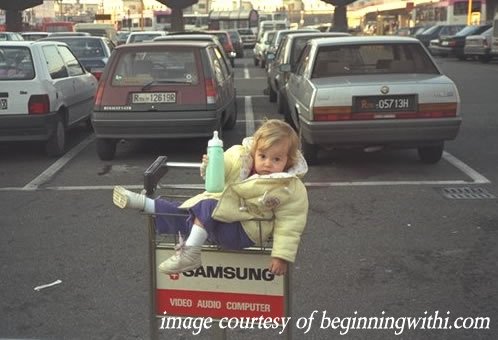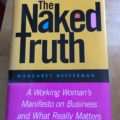The NYT reports on the phenomenon of daytime movie screenings at which parents are welcome to bring babies – presumably the entire audience understands and tolerates baby noise. If people were a bit more tolerant in general, this kind of thing wouldn’t be necessary. Bringing a baby to a usually baby-less venue doesn’t have to mean that everyone around the child suffers, as long as the parents behave with common politeness, and expect the same from their child (within the limits of his/her age and abilities).
We took Rossella to movies practically from birth (lots before birth, too). We love movies, and she was a tranquil infant, if a breast was readily available. As soon as she made the tiniest noise, I put her on the breast, she fed herself to sleep, and we went on enjoying the movie. (She could sleep through any kind of movie, no matter how loud.)
No one ever objected at the many Yale film society screenings we attended during her first months. One of the societies was at Yale med school, where we were objects of delighted attention from young med students, eager to display their new knowledge: “Look! There’s the fontanel!”
When I visited my aunt in Texas, we went to see a Woody Allen movie. We got there well ahead of schedule and settled into good seats. I left Ross with Rosie for a minute to go to the bathroom before the film started. While I was away, Ross started to fuss. A lady sitting nearby frowned at Rosie. “Don’t you think you should take that baby out of here?” “No,” replied Rosie calmly. The lady got up in a huff and changed seats. By the time the film started I was back in my seat, and Ross was quietly feeding.
I suppose the lady thought that we were going to allow the baby to disrupt her movie. Certainly not. If Ross had a problem that couldn’t be cured by a breast, I quickly took her outside. This, to me, was simply polite, and anyway I couldn’t concentrate on a movie with a fussing baby nearby, any more than anyone else could. We finally gave up going to movies with her around six months, when she was sleeping less and more active, and we could no longer keep her happy and quiet for the length of a film.
What everyone most dreads is babies on airplanes. Get onto a plane with a baby in your arms, or toddler by the hand, and see the pained winces, furtive looks, and muttered prayers: “Oh, please, don’t let it sit by me!” I got so tired of being on the receiving end of this that now, when I see a family with children coming to sit near me, I make a point of welcoming them with a smile, no matter how much I’m cringeing internally.
Ross and I travelled a lot when she was small. The trips were exhausting for me, because I worked very hard so that she would NOT annoy fellow-passengers. Several times, as I sat limp and drained (literally) at the end of a flight, exiting passengers would compliment me, with some relief, on how well my baby had behaved. “You have no idea how hard that was,” I would think to myself.
Ross was by and large cooperative, wanting only to be entertained. The one really bad flight we took was when she had just become extremely mobile (crawling). The plane was a double-decker 747, and our seat was on the aisle near the stairs to the upper deck. Ross was entranced with those stairs, and I spent the entire flight (Rome to NYC) chasing her. I didn’t mind her moving around, as long as she wasn’t about to trip somebody, but every time I let her go, she bolted immediately for those fascinating steps.
Ross was maybe a year when an older woman, seeing my struggles to keep her occupied during a flight, suggested: “Give her paper and a pen.” This hadn’t occurred to me; I assumed she was still too young. But she went right to it, happily scrawling away, and thereafter I made sure to have markers and an ample supply of paper for every flight. Perhaps the artistic ability Ross has now owes something to that kind lady.











